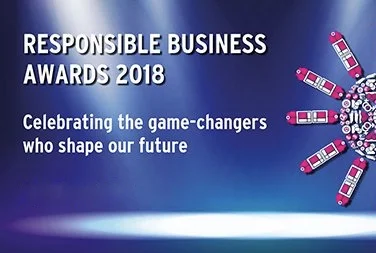“The 2018 finalists represent truly amazing initiatives and innovations from across the globe,” said Liam Dowd, managing director of Ethical Corporation, the independent business intelligence platform and sponsor of the international Responsible Business Awards. Now in their 9th year, the awards not only celebrate leadership in sustainable business, but recognize those companies that are setting new standards and truly having an impact on business, society and the environment. And this year, WWF is among the shortlist, nominated for its work with two of its corporate partners.
In the past two years alone, the Responsible Business Awards have recognized 38 entrants from 18 different countries, shining a light on the innovative strategies that are pushing the boundaries of corporate responsibility and sustainability forward. This year, they are also looking to reward companies that are helping to deliver the socially and environmentally-focused businesses of the future, and WWF is among the shortlist for the Supply Chain Management award, for its work with canned seafood producer Thai Union Europe (TUE), as well as Partnership of the Year, for its conservation efforts with Coca-Cola.
Readily acknowledging that it cannot tackle the environmental threats we face alone, WWF works in tandem with some of the world’s biggest corporations, often helping them to transform their industries from within. WWF has been working with TUE since 2014, embarking on an ambitious program to ensure that the seafood the company sells in Europe is sourced from the most sustainable sources, and with The Coca-Cola Company since 2007, initially to conserve river basins and integrate sustainability into the company’s operations, and then in 2012, specifically focusing on working towards securing a thriving future for English rivers, for which WWF and Coca-Cola have been shortlisted.
WWF’s partnership with TUE focuses on reducing the environmental impacts of fishing and securing the future of seafood supplies.
WWF’s partnership with TUE is helping the company make progress towards its commitment to source 100% of its branded tuna from fisheries that are Marine Stewardship Council certified or engaged in fishery improvement projects (FIPs). This commitment involves an investment of US$90 million in initiatives to increase the supply of sustainable tuna, including 11 new FIPs. It focuses on reducing the environmental impacts of fishing and securing the future of seafood supplies through better managed fisheries, more transparency, and a reduction in impacts on the wider ecosystem. And in addition to the supply chain work, TUE has provided funding to WWF’s sustainable fisheries program in east Africa, which supports the livelihoods of coastal communities through improved regional fisheries governance and better management of artisanal fisheries.
The WWF/Coca-Cola partnership works to address some of the issues and pressures affecting vital waterways.
With only a quarter of England’s rivers currently considered healthy enough to support thriving eco-systems, and given their uncertain future due to climate change and population growth, WWF partnered with Coca-Cola as part of their global ‘replenish programme’ to promote good water management nationally, as well as take direct action on the ground to reduce pollution and protect habitats. To date, this joint initiative has resulted in the clean up and improvement of 7km of river, the replenishment (return to nature) of over 286 million litres of water and, working with farmers across 2000 acres of land, a reduction in the impact of agriculture on the river Nar in Norfolk. Under a new program, sustainable farming work has also been significantly scaled up, by working directly with at least 100 farmers and engaging a further 2,000 in water sensitive and sustainable farming practices across areas where sugar beet, used in Coca-Cola’s GB drinks, is grown, and they are also working with The Rivers Trust and Catchment Based Approach (CaBA) partners to deliver three water management projects to replenish water in the Thames and South East River Basins for the benefit of both people and wildlife.
The winners of the Responsible Business Awards will be announced on Tuesday, 9th October 2018 at a ceremony in London.
Related Reading:
Global Clean-Ups: Inside The #ColombiaLimpia Initiative
Fiji's Sustainable Pearl Pioneer




